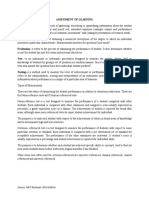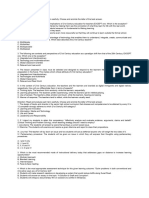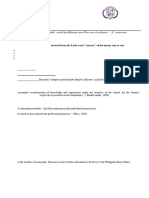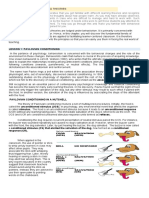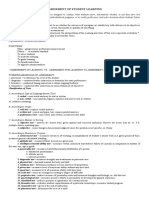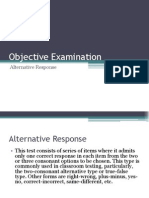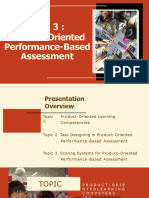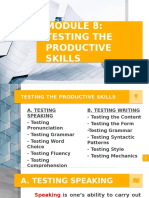100%(1)100% found this document useful (1 vote)
269 viewsAssessment in Learning 1: Ruel V. Perocho, Maed Sci. Ed. Instructor - BISU Candijay Campus
The document discusses assessment in learning and outlines some basic concepts of assessment. It states that a teacher's role is to facilitate learning and ensure there is a teaching-learning cycle. The only way for a teacher to know if students have learned is by conducting assessments. It also discusses that the focus of education has shifted from being teacher-centered to being learner-centered. Assessment is now used to modify teaching and learning activities based on learning outcomes rather than just evaluating content taught.
Uploaded by
Ruel PerochoCopyright
© © All Rights Reserved
Available Formats
Download as PPTX, PDF, TXT or read online on Scribd
100%(1)100% found this document useful (1 vote)
269 viewsAssessment in Learning 1: Ruel V. Perocho, Maed Sci. Ed. Instructor - BISU Candijay Campus
The document discusses assessment in learning and outlines some basic concepts of assessment. It states that a teacher's role is to facilitate learning and ensure there is a teaching-learning cycle. The only way for a teacher to know if students have learned is by conducting assessments. It also discusses that the focus of education has shifted from being teacher-centered to being learner-centered. Assessment is now used to modify teaching and learning activities based on learning outcomes rather than just evaluating content taught.
Uploaded by
Ruel PerochoCopyright
© © All Rights Reserved
Available Formats
Download as PPTX, PDF, TXT or read online on Scribd
You are on page 1/ 14
ASSESSMENT IN
LEARNING 1
RUEL V. PEROCHO, MAEd Sci. Ed.
Instructor - BISU Candijay Campus
BASIC CONCEPTS OF
ASSESSMENT
The Teacher and Assessment
A TEACHER is a facilitator of learning. Preparing a teaching lesson
cannot be completed in a round-a-clock period as it always demand
envisioning how to make teaching interesting, motivating and truly
enjoying. It employs various teaching principles, methods and
techniques for assurance that indeed there is teaching - learning cycle.
A TEACHER poses a major and never-ending challenge of producing
effective teaching-learning outcomes “with” the learners.
RUEL V. PEROCHO, MAEd Sci. Ed.
Instructor - BISU Candijay Campus
BASIC CONCEPTS OF
ASSESSMENT
continuation… The Teacher and Assessment
A TEACHER does not deserve to be addressed as “teacher” unless
there is discovery of successful transmission of learning among the
students, and that the “learner” has shown some indications that
teaching was indeed learned.
The only way that the teacher is convinced that indeed his learners
truly have learned is to conduct an assessment. Regardless of what
system and instruments he employs, through assessment we able to
discover what are learned and not, who learned and not and which
method is good and not.
RUEL V. PEROCHO, MAEd Sci. Ed.
Instructor - BISU Candijay Campus
BASIC CONCEPTS OF
ASSESSMENT
Assessment and Learning
ASSESSMENT. This is a scientific process of determining the present
state or condition of a specific and definite phenomenon with the
purpose of imposing programs and activities, for development and
improvement.
In school, it refers to all those activities undertaken by teachers, and
by their students in assessing themselves, which provide information to
be used as feedback to modify the teaching and learning activities in
which they engaged to achieve the purpose.
LEARNING. This refers to the sequential process of transmitting to and
possessing of knowledge on the basic educational domains along
cognitive, affective and psychomotor of certain individual or group.
RUEL V. PEROCHO, MAEd Sci. Ed.
Instructor - BISU Candijay Campus
BASIC CONCEPTS OF
ASSESSMENT
Paradigm Shift in Education
The traditional concept of education is putting emphasis on the
techniques and activities of the teacher to ascertain that “ all” student
are able to learn. This concept is inclined to the preparation of the
teacher and is therefore teacher-centered approach. It always
considers the importance of the knowledge obtained from prerequisites
in the curriculum which students have undergone.
The present trend focuses on the learners. This modern educational
trend is on determining the ways through which the unique “individual”
student is able to satisfactorily learn from instruction in his own pace and
style.
RUEL V. PEROCHO, MAEd Sci. Ed.
Instructor - BISU Candijay Campus
BASIC CONCEPTS OF
ASSESSMENT
Continuation… Paradigm Shift in Education
RUEL V. PEROCHO, MAEd Sci. Ed.
Instructor - BISU Candijay Campus
Shift of Educational Focus from
Content to Learning Outcomes
Education originated from the terms "educare" or "educere" which meant
"to draw out".
Ironically, however, for centuries we succeeded in perpetuating the belief
that education is a "pouring in" process wherein the teacher was the infallible
giver of knowledge and the student was the passive recipient.
The advent of technology caused a change of perspective in education,
nationally and internationally. The teacher ceased to be the sole source of
knowledge. With knowledge explosion, students are surrounded with various
sources of facts and information accessible through user-friendly technology.
The teacher has become a facilitator of knowledge who assists in the
organization, interpretation and validation of acquired facts and information.
RUEL V. PEROCHO, MAEd Sci. Ed.
Instructor - BISU Candijay Campus
“Content Based Learning is a study of both language acquisition and
subject matter. Instead of teaching language in isolation, the target
language becomes the medium in which important information can be
learned.
Content Based Learning is most appropriated at intermediate and
advanced proficiency levels. Content based activities extend student
vocabulary and knowledge, giving students words to use when they
speak or write, extending vocabulary and speaking and writing skills. In
other words, students learn new words with every activity, and create a
base of words built on the activity.
RUEL V. PEROCHO, MAEd Sci. Ed.
Instructor - BISU Candijay Campus
OUTCOMES BASED/OUTCOMES
FOCUSED EDUCATION
Outcomes based education (OBE) is a process that involves the
restructuring of curriculum, assessment and reporting practices in
education to reflect the achievement of high order learning and
mastery rather than the accumulation of course credits” (Tucker, 2004).
Thus the primary aim of OBE is to facilitate desired changes within the
learners, by increasing knowledge, developing skills and/or positively
influencing attitudes, values and judgment. OBE embodies the idea that
the best way to learn is to first determine what needs to be achieved.
Once the end goal (product or outcome) has been determined the
strategies, processes, techniques, and other ways and means can be
put into place to achieve the goal.
RUEL V. PEROCHO, MAEd Sci. Ed.
Instructor - BISU Candijay Campus
OUTCOMES BASED/OUTCOMES
FOCUSED EDUCATION:
Characteristics
It is student centered; it places the students at the center of the process
by focusing on Student Learning Outcomes (SLO)
It is faculty driven; that is, it encourages faculty responsibility for
teaching, assessing program outcomes and motivating participation
from the students.
It is meaningful; that is, it provides data to guide the teacher in making
valid and continuing improvement in instruction and assessment
activities.
RUEL V. PEROCHO, MAEd Sci. Ed.
Instructor - BISU Candijay Campus
To implement outcomes-based education on the subject or course level,
the following procedure is recommended:
1. Identification of the educational objectives of the subject/course.
2. Listing of learning outcomes specified for each subject/course
objective.
Benjamin Bloom's taxonomy of educational objectives:
Cognitive- also called knowledge, refers to mental skills such as
remembering, understanding, applying, analyzing, evaluating,
synthesizing/creating.
Psychomotor- also referred to skills, includes manual or physical skills,
which proceed from mental activities and range from simplest to the
complex such as observing, imitating, practicing, adapting and
innovating.
Affective- also known as attitude, refers to growth in feelings or emotions
from the simplest behavior to the most complex such as receiving,
responding, valuing, organizing and internalizing.
3. Drafting outcomes assessment procedure. RUEL V. PEROCHO, MAEd Sci. Ed.
Instructor - BISU Candijay Campus
EDUCATION: MATCHING
INTENTIONS WITH
ACCOMPLISHMENT
Outcomes-based education focuses classroom instruction on the skills and
competencies that students must demonstrate when they exit.
2 types of Outcomes:
1. Immediate outcomes- competencies/skills acquired upon completion of a
subject, a grade level, a segment of the program, or of the program itself.
(e.g. Ability to communicate in writing and speaking; Mathematical
problem-solving skill; graduation from a program; Initial Job Placement)
2. Deferred outcomes- refer to the ability to apply cognitive, psychomotor and
affective skills/competencies in various situations many years after
completion of a subject; grade level or degree program. (e.g. Success in
professional practice or occupation; Promotion in a Job; Awards and
recognition)
RUEL V. PEROCHO, MAEd Sci. Ed.
Instructor - BISU Candijay Campus
Sample Educational Objectives &Learning
Outcomes in Araling Panlipunan (K to 12)
EDUCATIONAL OBJECTIVE LEARNING OUTCOMES
Pagbibigay sa mga mag-aaral ng kaalaman at -Nailalarawan ang sariling buhay simula sa
pag-unawa tungkol sa tao, kapaligiran at lipunan pagsilang hanggang sa kasalukuyang edad.
(Cognitive Objective) -Nasasabi at naipapaliwanag ang mga
alituntunin sa silid-aralan at sa paaralan.
-Naiisa-isa ang mga tungkulin ng isang mabuting
mamamayan sa pangangalaga ng kapaligiran
Paglinang ng kakayahan na magsagawa ng -Nakakasulat ng sanyasay na naglalarawan ng
proyektong pantahanan at pampamayanan. mga taong bumubuo ng sariling pamilya.
(Psychomotor Objective) -Nakapagsasagawa ng panayam ng ilang
mahahalagang pinuno ng sariling barangay at
naisusulat ang mga nakalap na kaalaman.
Pagganyak sa mga mag-aaral upang -Nakasusulat ng tula, awit o maikling kwento
maipamalas ang malalim na pagpapahalaga sa tungkol sa kahalagahan ng kapaligiran.
kapaligiran. (Affective Objective) -Nakagagawa ng “video presentation” tungkol
sa wastong pag-aalaga ng kapaligiran.
RUEL V. PEROCHO, MAEd Sci. Ed.
Instructor - BISU Candijay Campus
EXERCISE: Get ½ sheet of paper
(Crosswise Cut) (Elementary Science for k-12)
EDUCATIONAL OBJECTIVE LEARNING OUTCOMES
(Cognitive Objective) 1.1 The pupils can
1 To provide instruction that will enable the pupils _________________________________________________
to understand their immediate physical _______________________________________________
environment by using their senses, questioning,
sharing ideas and identifying simple cause-and- 1.2 The pupils can
effect relationships. _________________________________________________
_______________________________________________
(Psychomotor Objective) 2.1 The pupils can
2 To equip the pupils with the skill to conduct _________________________________________________
guided investigation by following a series of steps _______________________________________________
that includes making and testing predictions,
collecting and recording data, discovering 2.2 The pupils can
patterns and suggesting possible explanations. _________________________________________________
_______________________________________________
(Affective Objective) 3.1 The pupils can
3 To encourage among the pupils a deep _________________________________________________
understanding and appreciation of the differences _______________________________________________
of the plant and animal groups found in the
locality. 3.2 The pupils can RUEL V. PEROCHO, MAEd Sci. Ed.
_________________________________________________
Instructor - BISU Candijay Campus
_______________________________________________
You might also like
- Late 19th Century Industrial Era Work Welfare++21No ratings yetLate 19th Century Industrial Era Work Welfare++215 pages
- Exhaust and Muffler Design of A Formula SAE Car67% (3)Exhaust and Muffler Design of A Formula SAE Car14 pages
- Type of Curriculum Design in K To 12 Illustrative Examples: Subject-Centered Design/ApproachNo ratings yetType of Curriculum Design in K To 12 Illustrative Examples: Subject-Centered Design/Approach1 page
- Lesson 6 Establishing Test Validity and ReliabilityNo ratings yetLesson 6 Establishing Test Validity and Reliability19 pages
- Product-Oriented Performance-Based Assessment100% (1)Product-Oriented Performance-Based Assessment8 pages
- TQLR - This Can Be Taught To Younger Students (Primary Grades) - It Is ANo ratings yetTQLR - This Can Be Taught To Younger Students (Primary Grades) - It Is A2 pages
- Assessing Skills, Deep Understanding and Reasoning: Performance-Based AssessmentsNo ratings yetAssessing Skills, Deep Understanding and Reasoning: Performance-Based Assessments34 pages
- The Teacher and The School Curriculum Midterm100% (1)The Teacher and The School Curriculum Midterm14 pages
- Module 4 CHAPTER 4 DESIGNING AND DEVELOPING ASSESSMENT TOOLS100% (1)Module 4 CHAPTER 4 DESIGNING AND DEVELOPING ASSESSMENT TOOLS7 pages
- Lesson 2: Enchanced Teacher Education Curriculum Anchored On OBENo ratings yetLesson 2: Enchanced Teacher Education Curriculum Anchored On OBE24 pages
- Group 2 - Definition of The 21ST Century Literatures PDFNo ratings yetGroup 2 - Definition of The 21ST Century Literatures PDF26 pages
- MIDTERM4.1Utilization of Assessment DataNo ratings yetMIDTERM4.1Utilization of Assessment Data5 pages
- B. Krathwohl's Taxonomy of The Affective DomainNo ratings yetB. Krathwohl's Taxonomy of The Affective Domain16 pages
- Technology For Teaching and Learning 1: MC Allied 2 SF/ Profed 08heNo ratings yetTechnology For Teaching and Learning 1: MC Allied 2 SF/ Profed 08he9 pages
- General Guidelines in Constructing Good Problem-Solving Test ItemsNo ratings yetGeneral Guidelines in Constructing Good Problem-Solving Test Items5 pages
- Unit 3 Product Oriented Performance Based AssessmentNo ratings yetUnit 3 Product Oriented Performance Based Assessment27 pages
- 2.4 Assessment For, of and As Learning (GROUP 7)No ratings yet2.4 Assessment For, of and As Learning (GROUP 7)10 pages
- Instant ebooks textbook Foundations of Dynamic Economic Analysis Optimal Control Theory and Applications 1st Edition Michael R. Caputo download all chapters100% (22)Instant ebooks textbook Foundations of Dynamic Economic Analysis Optimal Control Theory and Applications 1st Edition Michael R. Caputo download all chapters85 pages
- Special Situations: Intradialytic Hypertension/chronic Hypertension and Intradialytic HypotensionNo ratings yetSpecial Situations: Intradialytic Hypertension/chronic Hypertension and Intradialytic Hypotension8 pages
- Fourth Grade Reading Success Complete Learning Kit - Excerpt33% (3)Fourth Grade Reading Success Complete Learning Kit - Excerpt29 pages
- Brake Master Cylinder - Expansion Tank BMW E60 Sedan 47750No ratings yetBrake Master Cylinder - Expansion Tank BMW E60 Sedan 477502 pages
- (MS1R) Common Representative Rheumatic DiseasesNo ratings yet(MS1R) Common Representative Rheumatic Diseases6 pages
- Dissimilar Welding of AISI 309 Stainless Steel To AISI 1020 Carbon Steel Using Arc Stud WeldingNo ratings yetDissimilar Welding of AISI 309 Stainless Steel To AISI 1020 Carbon Steel Using Arc Stud Welding6 pages
- Telephone Billing System Project AbstractNo ratings yetTelephone Billing System Project Abstract2 pages
- Rethinking Resistance: (S. Ramnarayan and Christian Harpelund)100% (1)Rethinking Resistance: (S. Ramnarayan and Christian Harpelund)12 pages
- NoI DUNG On TaP KIeM TRA HoC Ky I - MoN TIeNG ANH 11 THi dIeM - Nam Hoc 2019 - 2020 5edaa36538No ratings yetNoI DUNG On TaP KIeM TRA HoC Ky I - MoN TIeNG ANH 11 THi dIeM - Nam Hoc 2019 - 2020 5edaa3653818 pages
- Type of Curriculum Design in K To 12 Illustrative Examples: Subject-Centered Design/ApproachType of Curriculum Design in K To 12 Illustrative Examples: Subject-Centered Design/Approach
- Lesson 6 Establishing Test Validity and ReliabilityLesson 6 Establishing Test Validity and Reliability
- TQLR - This Can Be Taught To Younger Students (Primary Grades) - It Is ATQLR - This Can Be Taught To Younger Students (Primary Grades) - It Is A
- Assessing Skills, Deep Understanding and Reasoning: Performance-Based AssessmentsAssessing Skills, Deep Understanding and Reasoning: Performance-Based Assessments
- Module 4 CHAPTER 4 DESIGNING AND DEVELOPING ASSESSMENT TOOLSModule 4 CHAPTER 4 DESIGNING AND DEVELOPING ASSESSMENT TOOLS
- Lesson 2: Enchanced Teacher Education Curriculum Anchored On OBELesson 2: Enchanced Teacher Education Curriculum Anchored On OBE
- Group 2 - Definition of The 21ST Century Literatures PDFGroup 2 - Definition of The 21ST Century Literatures PDF
- Technology For Teaching and Learning 1: MC Allied 2 SF/ Profed 08heTechnology For Teaching and Learning 1: MC Allied 2 SF/ Profed 08he
- General Guidelines in Constructing Good Problem-Solving Test ItemsGeneral Guidelines in Constructing Good Problem-Solving Test Items
- Unit 3 Product Oriented Performance Based AssessmentUnit 3 Product Oriented Performance Based Assessment
- Instant ebooks textbook Foundations of Dynamic Economic Analysis Optimal Control Theory and Applications 1st Edition Michael R. Caputo download all chaptersInstant ebooks textbook Foundations of Dynamic Economic Analysis Optimal Control Theory and Applications 1st Edition Michael R. Caputo download all chapters
- Special Situations: Intradialytic Hypertension/chronic Hypertension and Intradialytic HypotensionSpecial Situations: Intradialytic Hypertension/chronic Hypertension and Intradialytic Hypotension
- Fourth Grade Reading Success Complete Learning Kit - ExcerptFourth Grade Reading Success Complete Learning Kit - Excerpt
- Brake Master Cylinder - Expansion Tank BMW E60 Sedan 47750Brake Master Cylinder - Expansion Tank BMW E60 Sedan 47750
- Dissimilar Welding of AISI 309 Stainless Steel To AISI 1020 Carbon Steel Using Arc Stud WeldingDissimilar Welding of AISI 309 Stainless Steel To AISI 1020 Carbon Steel Using Arc Stud Welding
- Rethinking Resistance: (S. Ramnarayan and Christian Harpelund)Rethinking Resistance: (S. Ramnarayan and Christian Harpelund)
- NoI DUNG On TaP KIeM TRA HoC Ky I - MoN TIeNG ANH 11 THi dIeM - Nam Hoc 2019 - 2020 5edaa36538NoI DUNG On TaP KIeM TRA HoC Ky I - MoN TIeNG ANH 11 THi dIeM - Nam Hoc 2019 - 2020 5edaa36538





